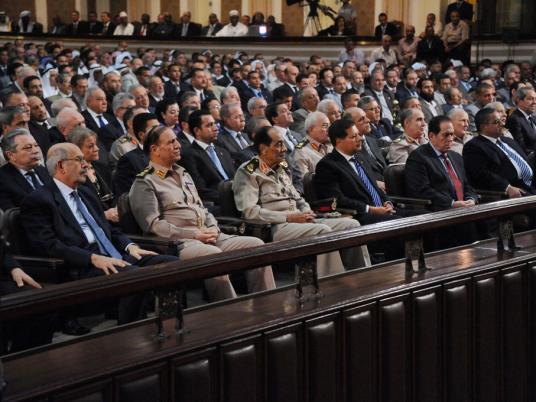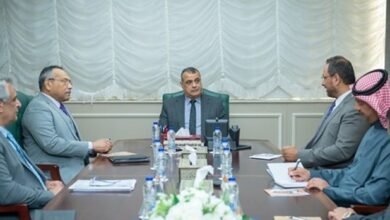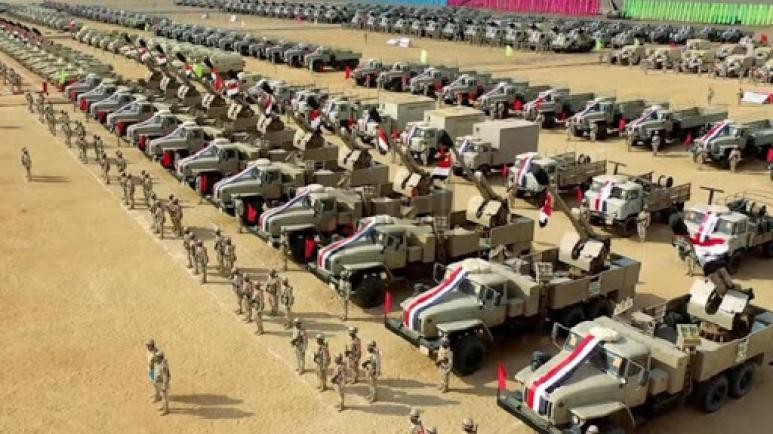
The president would be the supreme commander of the armed forces. The defense minister, to be recruited from the military and chosen by the president, would be the armed forces’ general commander. These would be the scenario if one of the articles submitted by the Constituent Assembly’s Defense and National Security Committee is passed.
This and other articles proposed for the country’s new constitution could contribute to the writing of a new chapter in the history of military-civilian relations in Egypt.
The Defense and National Security Committee, responsible for the articles relating to the military in the constitution-writing assembly, announced Monday that it had concluded its mission. The committee handed in the first draft of the articles to the drafting committee, in preparation for putting it to a general vote for the assembly’s 100 members.
The articles would ease the fears of many who worried the military would attempt to cement the political role it acquired after Hosni Mubarak’s downfall into the constitution.
Committee members said the status of the military in the new constitution would resemble the one it had in the 1971 Constitution: It would not have any political powers. In the 1971 Constitution, the articles relating to the military were limited, only stating its role in protecting the nation and leaving most details to be regulated by laws.
The difference between the new constitution and that of 1971, however, lies in the political context in which both are written and the fact that — for the first time in Egypt’s post-colonial history — the executive branch of government would be led by civilians. Mohamed Morsy of the once-banned Muslim Brotherhood was elected in June, becoming the country’s first civilian president.
A nine-member committee drafted the articles. As it announced its latest developments during the Constituent Assembly’s meeting last week, it stirred many objecting voices within the group, suggesting that voting procedures might not go smoothly.
The committee is headed by the Ghad al-Thawra Party founders’ deputy, Mohamed Mohey Eddin. Members include Supreme Council of the Armed Forces representative Mamdouh Shahin, Muslim Brotherhood leaders Essam al-Erian and Osama Yassin, Wasat Party president Abul Ela Mady and former presidential candidates Amr Moussa and Ayman Nour.
In an interview with Egypt Independent, Mohey Eddin said the committee determined that it would be difficult in this period to have a civilian defense minister, and the military hasn’t argued over the president’s powers over the military institution.
“The doctrine of the armed forces has always been loyalty to the political authority elected by the people,” Mohey Eddin said, explaining that it’s normal for the military to accept the sovereignty of the elected president.
Mohey Eddin said the specific role of the SCAF would also be drafted into the constitution. The 21-member council, which has been the de facto ruler of the country since Mubarak’s ouster, consists of the commanders of the different branches of the armed forces and was previously headed by the president.
Seeming to aim primarily at cushioning civilian oversight of the military, the committee suggested the creation of a national defense council comprising both military leaders and civilians, including the interior, foreign, justice, defense and finance ministers; the speakers of both houses of Parliament; and the president.
Mohey Eddin said the council would be responsible for the discussion of legislation relating to the military prior to its discussion in Parliament, and for the detailed discussion of the military budget prior to its presentation to Parliament as one figure.
The national defense council is mentioned in the 1971 Constitution, but it was inactive and its mission was not specified.
The article regarding the decision to go to war, which caused a lot of debate during the assembly meeting, ended up stipulating that the president has the right to declare war after consulting the SCAF and acquiring the approval of the national defense council and Parliament. In the 1971 Constitution, only Parliament’s approval was needed for the president to declare war.
People have been calling for civilian oversight of the economic ventures of the military, which researchers have estimated to be reaching as much as one-third of the economy. Mohey Eddin said the constitution treats the military institutions’ businesses as separate from its military budget and that it’s subject to oversight by the official auditing bodies, similar to the businesses run by other state bodies.
He explained that there was no tension over the power of the military institution in the committee’s work. He dismissed rumors that the military representative in the committee suggested articles that would give his institution political power, and said the draft was created unanimously within the committee.
“I can say with certainty that the SCAF is neither asking for a political role in the constitution, nor are the committee members willing to give it one,” he said, adding that the committee’s work has been focused on finding a balance that would allow for the military to accomplish its mission of protecting the nation without granting it political power.
Meanwhile, Sameh Seif al-Yazal, a former general, said it is unlikely that the articles concerning the military to pass as they are now. Refusing to specify what the changes are or who requested them, Yazal said he has information that the articles will undergo changes.
Tamer al-Meehy, a politician and member of the Egyptian Social Democratic Party, said he sees the articles as offering a gateway for military interference in the sovereignty of elected civilians. He particularly commented on how the national defense council can manifest this concern, if its mandate is that of a decision maker as opposed to a platform for consultation.
“This would mean that the president would rule Egypt, except for the military,” he said.
Meehy added that the mandate should be specific because “national security in some definitions can go all the way down to shortages of oil and sugar,” he said.
He said he thought the defense minister shouldn’t necessarily come from the military establishment, but deemed the arrangement in the proposed articles an acceptable compromise.
“Naturally the constitution will have a transitional nature that reflects the transition of power from military to civilians. This is one of the guarantees given to the military [by civilians],” Meehy said.
Meanwhile, the Ruling System Committee announced that it finished its drafting process Monday. Among its propositions, the committee suggested that the president should be the head of the national defense council and the supreme commander of the armed forces, and have the exclusive power to appoint the interior and defense ministers.
Besides having been the executive ruler in the months that followed Mubarak’s ouster, the SCAF continues to hold legislative power after a court disbanded the elected Parliament in June, deeming the elections law unconstitutional.
Political forces have been closely monitoring the SCAF, anticipating that it would attempt to keep some of this political power in the constitution in the wake of a robust and unprecedented civilian advent to power.
A judicial danger threatening the dissolution of the Constituent Assembly and scrapping its work subsided Monday when an administrative court decided to postpone the verdict in the case against the assembly until 24 September.
The assembly is expected to have a draft constitution ready for referendum before this date. The fate of this draft if the September court ruling disbands the assembly, however, remains unknown.
This piece was originally published in Egypt Independent's weekly print edition.




